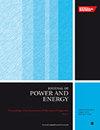用于微型热光电应用的带有梯形肋条的 H2/Air 燃料微型燃烧特性的数值研究:肋条高度的影响
IF 1.1
4区 工程技术
Q3 ENGINEERING, MECHANICAL
Proceedings of the Institution of Mechanical Engineers, Part A: Journal of Power and Energy
Pub Date : 2023-07-14
DOI:10.1177/09576509231189774
引用次数: 0
摘要
在这项数值研究中,研究了等距梯形肋条对预混合 H2- 空气微燃烧特性的影响,重点是肋条高度。研究全面考察了火焰结构、火焰前沿位置、火焰速度和燃烧效率。研究对后向阶梯式微型燃烧器(MCSD)和不同肋片高度的微型燃烧器进行了比较分析:MCRD1(0.5 毫米)、MCRD2(0.6 毫米)和 MCRD3(0.7 毫米)。加入梯形肋片后,形成了细长且分布均匀的再循环区,显著增强了混合效果并提高了火焰稳定性,尤其是在肋片高度较高的情况下。再循环区在影响化学反应速率和物种分布方面发挥了关键作用,从而提高了火焰速度和燃烧强度。研究结果凸显了加入肋条对燃烧效率的影响。MCRD1、MCRD2 和 MCRD3 的燃烧效率值分别为 96.95%、96.75% 和 96.61%,而 MCSD 的燃烧效率为 97.14%。因此,建议的肋条高度范围被认为有利于确保在改善火焰稳定性和保持令人满意的燃烧效率之间实现最佳平衡。研究结果为优化微型热光电系统提供了有价值的见解。本文章由计算机程序翻译,如有差异,请以英文原文为准。
Numerical investigation of H2/Air fueled micro combustion characteristics with trapezoidal ribs for micro thermophotovoltaic applications: Effect of rib height
In this numerical study, the impact of equidistant trapezoidal ribs on the characteristics of premixed H2-air micro-combustion was investigated, with a specific focus on the rib height. The study comprehensively examined flame structure, flame front position, flame speed, and combustion efficiency. A comparative analysis was performed between a backward-facing step micro combustor (MCSD) and micro combustors with varying rib heights: MCRD1 (0.5 mm), MCRD2 (0.6 mm), and MCRD3 (0.7 mm). The incorporation of trapezoidal ribs resulted in the creation of elongated and evenly distributed recirculation zones, significantly enhancing mixing and promoting flame stability, particularly at higher rib heights. The recirculation zones played a critical role in influencing the chemical reaction rate and the species distribution, leading to higher flame speed and greater combustion intensity. The findings highlight the outcomes of incorporating ribs in terms of combustion efficiency. The combustion efficiency values for MCRD1, MCRD2, and MCRD3 were recorded as 96.95%, 96.75%, and 96.61%, respectively, while the MCSD had a combustion efficiency of 97.14%. Hence, the recommended range of rib height is considered advantageous in ensuring an optimal balance between improved flame stabilization and maintaining a satisfactory level of combustion efficiency. The findings provide valuable insights for optimizing micro-thermophotovoltaic systems.
求助全文
通过发布文献求助,成功后即可免费获取论文全文。
去求助
来源期刊

CiteScore
3.30
自引率
5.90%
发文量
114
审稿时长
5.4 months
期刊介绍:
The Journal of Power and Energy, Part A of the Proceedings of the Institution of Mechanical Engineers, is dedicated to publishing peer-reviewed papers of high scientific quality on all aspects of the technology of energy conversion systems.
 求助内容:
求助内容: 应助结果提醒方式:
应助结果提醒方式:


